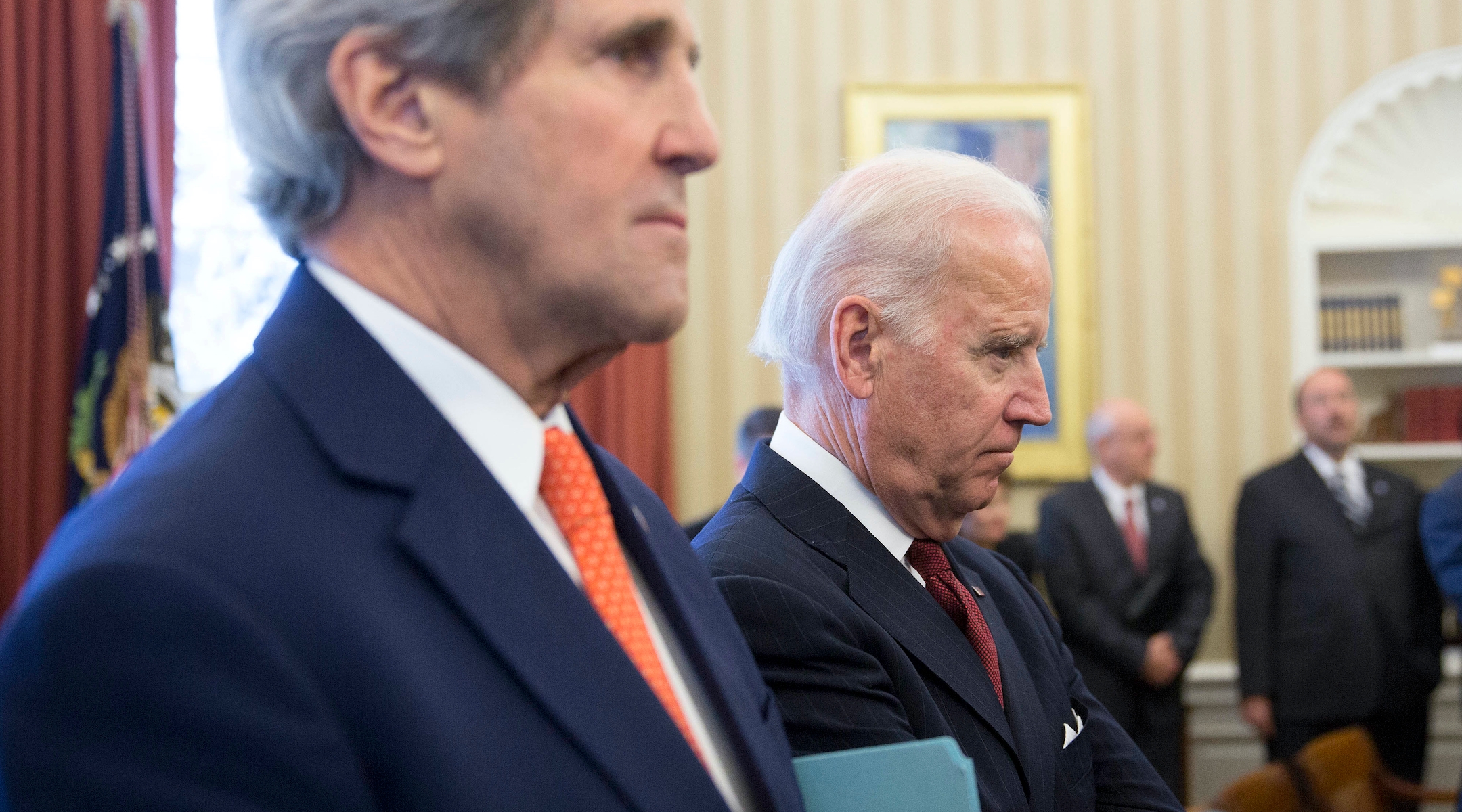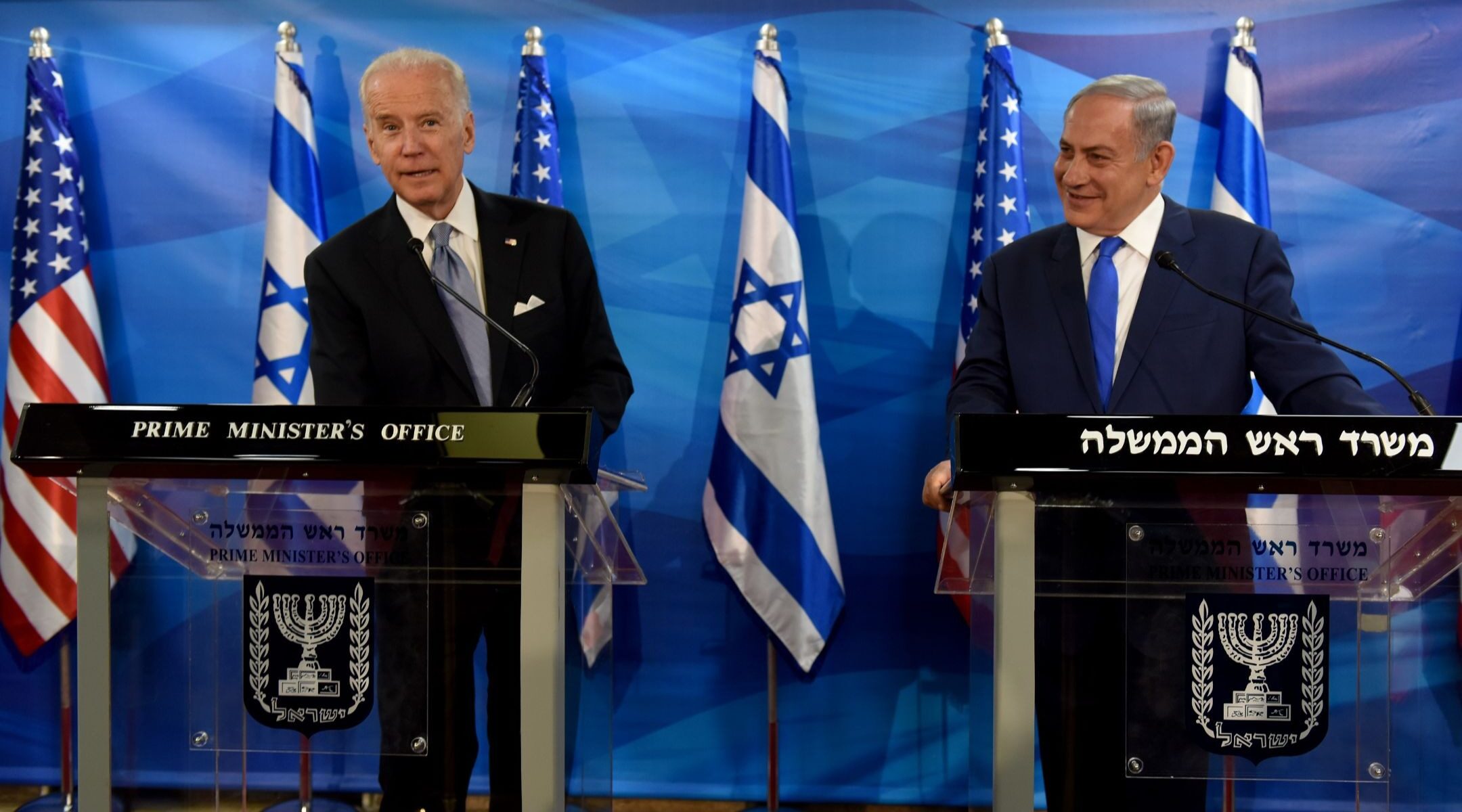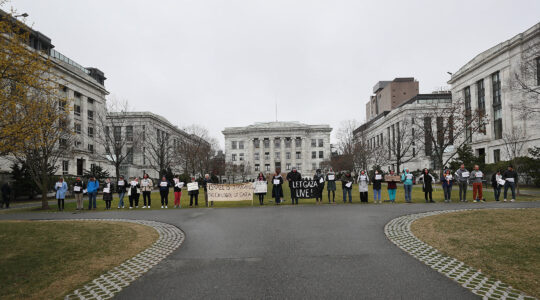WASHINGTON (JTA) — Talk to the folks who handled the Israel file and who were close to Joe Biden between 2009 and 2017, and his boss, Barack Obama, more often than not comes up, even if not by name.
Biden was the guy Israelis looked to for support, they say, implying that Obama was … less supportive. Biden was the guy who bridged differences created by the mutual distrust between Obama and Israeli Prime Minister Benjamin Netanyahu.
The Jewish Telegraphic Agency spoke with half a dozen people who saw the Biden-Israel relationship up close during the years that Biden served under President Obama as vice president. What emerges is a picture of a man who did little to innovate policy but who was a loyal lieutenant to Obama and remained a friend to Israel — and he was often left to use the negotiating skills he honed through decades in the Senate to bridge the divide.
“If the kishkes question haunted Obama right through his presidency, Biden passed by flying colors,” said Shalom Lipner, who worked in the prime minister’s office throughout the Obama-Biden years, using the Yiddish word for “guts” that kept coming up in interviews, including, joltingly, with non-Jews. The term, dating at least back to the Clinton presidency, is used to describe politicians who have a visceral understanding of Israel.
“I wouldn’t go so far as to say Obama was the bad cop — but Biden was the good cop,” Lipner said. “The people in the Biden universe you could reach out to because there was history there, but most of the Obama people were new. You didn’t have that history.”
The single overarching difference between Obama and Biden when it comes to Israel was Biden’s preference for keeping differences behind closed doors.
“I think the difference is that Biden reserved his most strident criticism for Netanyahu for behind the scenes,” said someone close to Biden who requested anonymity to avoid jeopardizing their relationship with the former vice president. “There was a lot less public drama involving Biden.”
Biden vividly described the difference between Netanyahu the seasoned pol and Obama the relative neophyte to Michael Oren, the former U.S. ambassador to Israel. “One comes with baggage and the other without bags,” Oren recalled Biden saying in his book describing his 2009-2013 ambassadorship, “Ally.”
An interlocutor who was close to Obama, Biden, and Netanyahu put it bluntly.
“Barack Obama is correct and Spockish,” said this person, who asked not to be named in order not to offend any party, and who was referring to the Star Trek character famous for his wisdom and for keeping his emotions in check. “Biden can talk to people and he will remember their families and where they live.”
The fact that Netanyahu could trust Biden was critical, said Dennis Ross, a top Middle East adviser to Obama in his first term. Netanyahu “understood that Biden would disagree with him on a lot of things but never questioned Biden’s basic friendship,” said Ross, who is now counsel at the Washington Institute for Near East Policy, a think tank. “And as a result, there were things he would do with Biden that he would not have done with someone that he didn’t trust.”
Biden’s relationship with Israel dates back to 1973, when as a freshman senator from Delaware he visited the country on the eve of the Yom Kippur war.
“There’s hardly anyone out anyone out there who was in the U.S. government in 1973, and is still involved in politics in 2020,” said David Makovsky, a member of the Obama administration team that tried in 2013-2014 to broker an Israeli-Palestinian peace and is now at the Washington Institute. “He remembers an Israel that is not just a startup nation, but facing wars.”
Biden has said that he hopes to maintain a robust relationship with Israel as president, although he differs sharply from President Donald Trump in some areas: Biden would return to the Iran nuclear deal, albeit under what he says would be stricter terms limiting Iran’s nuclear capabilities. He would uphold the two-state solution and would reject the portions of Trump’s peace proposal that would allow Israel to annex West Bank territory, although he would not condition aid to Israel over compliance with U.S. policy.
One facet of Trump’s Middle East policy Biden has welcomed is the recent proliferation of normalization agreements between Israel and the United Arab Emirates, Bahrain and Sudan.
Here are five snapshots from the Obama-Netanyahu relationship illustrating Biden’s role as Israel whisperer.
A 2010 dinner gets delayed, but not canceled
Obama launched a bid to get to Israeli-Palestinian peace from the get-go. His top negotiator, George Mitchell, was despairing of a deal by 2010 and seeking an end to the impasse. Obama sent Biden to Israel to calm tensions between the Israeli and U.S. sides.
The visit was almost torpedoed when a lower-level functionary announced, just in time for Biden’s visit, a new housing development in disputed eastern Jerusalem.
Biden’s response was to turn up more than an hour late to a planned dinner with Netanyahu and his wife, Sara — but not to cancel the dinner. Biden was appeased after Netanyahu expressed regret for the announcement and his officials relayed a pledge to Biden that Israel would not build in the area for several years.
Lipner said Biden did not want to waste the opportunity to kick-start the peace process. “He was sympathetic to Israel but I think he probably appreciated the value of being able to do what he had come out here to do,” he said. “He was more amenable to say, ‘OK, let’s get this back on track.’”
Alan Solow, an Obama donor and at the time the chairman of the Conference of Presidents of Major American Jewish Organizations, said Biden had been looking forward to the trip, which he made clear in a meeting with the Jewish communal leadership before he traveled.
“He was with a bunch of friends,” Solow recalled. “He was talking about a subject that he knew a lot about and that he cared about and that he loved. And, you know, at some point, probably 45 minutes after he was supposed to be done, I got a tip to extract him from the meeting — unwillingly.”
Obama, however, was furious about the development and wanted a strong statement: He asked Biden to condemn the planned building in a speech he gave at Tel Aviv University. Biden did, while describing the U.S.-Israel relationship as “unbreakable” and “impervious.”
Ross objected to the Obama’s directive that Biden use the word “condemn,” saying the term was too strong, and usually used for terrorist attacks. Ross’ impression was that Biden was also unhappy with the term. But Biden knew how to extract lemonade from the lemons he was handed: He met with Palestinian Authority President Mahmoud Abbas, who was appeased by the use of the word “condemned” and who stayed in the negotiations.
“He took advantage of a word that had been issued by the White House,” said Ross. “The irony was, Abu Mazen came out satisfied.” Abu Mazen is Abbas’ nickname.

Then-Vice President Biden stands next to John Kerry, then-U.S. secretary of state, as Obama and Netanyahu meet in the Oval Office, March 3, 2014. Obama urged Netanyahu to “seize the moment” to make peace, saying time was running out to negotiate an Israeli-Palestinian agreement. (Andrew Harrer/White House Pool/Corbis/VCG via Getty Images)
1967 lines and reception lines
Netanyahu, on his way to the United States in May of 2011 to meet with Obama, was blindsided by a Middle East policy speech by Obama, in which the U.S. president said he envisioned an outcome of two states, based on the 1967 lines, with land swaps.
Netanyahu saw the speech as pressuring Israel into making concessions that would endanger its security, and in a famous scene, lectured Obama in the Oval Office about Middle East history.
The tensions persisted and were not dissipated by the time Netanyahu spoke to a joint meeting of the U.S. House of Representatives and the Senate. But then, at the reception after Netanyahu’s address, Biden showed up.
Lipner recalls Biden working his charm as if nothing had happened. “There was a reception on the Hill, and Biden was there pressing the flesh,” Lipner recalled, which he said comforted the Israeli delegation.
More substantively, Ross said, Biden launched talks with Israel to use the ideas Obama outlined in his speech as the basis for a joint U.S.-Israeli-Palestinian statement that would agree on terms, including “that Israel would be the nation-state of the Jewish people and Palestine would be the nation-state of the Palestinian people.”
It was another instance, Ross said, of Biden hoping to extract lemonade from lemons — but this time it didn’t work. Abbas rejected the principle of recognizing Israel as the “nation-state of the Jewish people.”
“Get it done”: Missiles for the 2014 Gaza War
Daniel Shapiro, a top National Security Council official in Obama’s first term and the ambassador to Israel in his second, said Biden had a hand in funding the Iron Dome short-range anti-missile system during the early years of the Obama administration.
Eric Lynn, then a senior Pentagon official, added that Biden was critical in getting funding for supplemental missile batteries to Israel during the 2014 Gaza War.
“Israel needed to produce many more of the Iron Dome missiles and quite quickly, so they came to State to ask for an emergency level of funding for resupplying the Iron Dome missile,” he said. “As soon as that request was made by the Israelis in the middle of the conflict and taken to the president, Vice President Joe Biden’s words and President Obama’s words were ‘Get it done.’”
Iran: “Never tell another man his own interest”
The greatest U.S.-Israel divide during the Obama administration was over the Iran nuclear deal.
Obama said the best means of containing Iran was to work with other major nations to relieve sanctions in exchange for Iran rolling back its nuclear program. Netanyahu said the plan endangered Israel, and wanted the United States to pressure Iran to end its nuclear program in total, and to end its adventurism in the region and its missile program.
Biden has suggested during this campaign that he believes Obama’s plan needs improvements, particularly in extending the period through which Iran must restrict its nuclear activity.
At the time, however, Biden’s job was to sell the plan to Israel, to the Jewish community and to Congress — and he delivered, pulling through for Obama and putting him squarely at odds with the Israeli government.
Someone close to Biden said that after the deal was signed in 2015 the vice president “really leaned in … to make the case to members of Congress that they shouldn’t block it. He met with the entire Democratic Caucus.”
Some Jewish Democrats — under pressure from the American Israel Public Affairs Committee to reject the deal — were especially hard sells. Rep. Debbie Wasserman Schultz, in South Florida, wept when she revealed on TV that she would back the deal.
“He took a special trip down to Debbie Wasserman Schultz’s district to defend the deal,” said the person close to Biden. “He had groups of congressmen and women and senators to his house at the Naval Observatory, multiple times.”
Solow recalled “any number of meetings” with the Jewish community leadership in which Biden made the case for the deal.
Shapiro, ambassador to Israel at the time, said Biden was just as dogged with Israeli leaders — and was also eager to bring the Israeli perspective back to Obama.
He recalled a private dinner Biden had with Netanyahu and others in January 2014, when Biden attended the funeral of former Israeli Prime Minister Ariel Sharon.
“They had one of those intense, friendly discussions,” Shapiro said. “It was an important channel to obviously express the U.S. perspective, but also to hear the Israeli perspective. He always liked to also bring that perspective back into the discussion.”
Critically, Shapiro said, Biden did not condescend to the Israelis.
“Biden has a saying which he attributes to his father, which is, ‘Never tell another man his own interest,’” Shapiro said. “He never tried to lecture Israeli leaders on what their interest was.”
That would have been a contrast with Obama, whom Israelis perceived as thinking he understood Israel’s best interests better than they did.
A prediction on that UN resolution comes true
The Obama administration got wind in its final months of Palestinian efforts to get through the U.N. Security Council a resolution condemning Israel’s settlements.
According to insiders, a number of top officials — including Secretary of State John Kerry and Samantha Power, the ambassador to the United Nations — wanted to vote for the resolution, seeing it as an opportunity to make clear to Israel’s government that the two-state solution could soon disappear. Biden and Jack Lew, the Treasury secretary who is Jewish, wanted the United States to veto the resolution.
“Biden’s argument was that we could end up encouraging the Trump administration right out of the gate to try to swing the pendulum all the way back in ways that would undermine what we’re trying to achieve,” said someone who is close to Biden, explaining his opposition. Biden also thought the United Nations was the wrong arena to resolve the Israeli-Palestinian dispute.
At the last moment on Dec. 23, 2016, Obama split the difference — literally minutes before Power was set to vote, according to Shapiro — and instructed his ambassador to abstain, which would allow the resolution through, but make clear that the Obama administration thought the resolution lacked balance because it did not mention Palestinian obstructionism.
Biden’s prediction came true: Trump condemned the abstention and has retreated from supporting the two-state outcome that Obama had spent eight years seeking.
Shapiro, who as the U.S. ambassador to Israel was monitoring the back and forth in real time, said reports subsequent to the vote that Biden pressured Ukraine to vote for the resolution were nonsense. Biden’s campaign has flatly said the reports are wrong, and that the calls with Ukraine were routine and did not touch on Israel. According to Shapiro’s account, the timing made no sense: Obama didn’t decide which way Power would vote until the final moment.
Any claim that Biden advocated for the resolution, particularly with respect to Ukraine, he said, is “just completely wrong.”
JTA has documented Jewish history in real-time for over a century. Keep our journalism strong by joining us in supporting independent, award-winning reporting.






